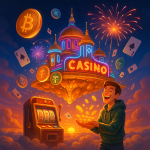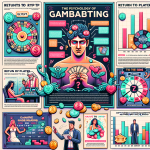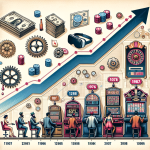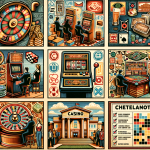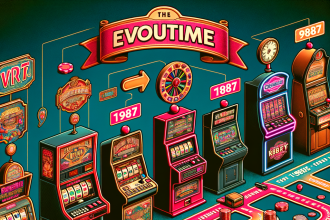In recent years, the rise of online gambling and the glamorization of high-stakes games have brought professional gambling into the spotlight. While the world of professional gamblers is often romanticized, it is essential to understand the realities of this unique lifestyle. Professional gamblers, who range from poker maestros to sports betting savants, have intricate strategies, deep knowledge of their games, and a strong resilience towards risk. This article delves into the motivations behind their choices and the myths surrounding their profession, revealing the complex tapestry of life as a professional gambler.
The Thrill of High Stakes: Why Professionals Choose Gambling
The Allure of Financial Freedom
For many professional gamblers, the primary draw is the potential for financial independence. Unlike traditional 9-to-5 jobs, where salary caps can limit earnings, gambling offers a unique opportunity for unlimited profit. A successful poker player or sports bettor can make substantial amounts in a single session, often surpassing what might be earned in a month at a conventional job.
- Flexibility: Professional gamblers set their schedules, allowing them to choose when and where they work. This level of autonomy is incredibly appealing, especially for those who value personal freedom.
- Potential for High Earnings: Compared to regular jobs, the risk-reward ratio in gambling can be significantly more favorable, provided the gambler employs sound strategies.
- Lifestyle Choices: Many professional gamblers live a lifestyle filled with travel and luxury, attending high-stakes tournaments and enjoying the perks that come with success.
The Excitement of the Game
Beyond financial considerations, the excitement of the game itself is a powerful motivator. The thrill of competition, the adrenaline rush of high-stakes betting, and the satisfaction of outsmarting opponents all contribute to the allure of professional gambling.
- Strategic Depth: Games like poker require not only luck but also a deep understanding of psychology and strategy, making each hand a unique challenge.
- Continuous Learning: Professional gamblers often view gambling as a lifelong pursuit, where they constantly refine their skills, analyze their performances, and adapt to ever-changing conditions.
- Community and Camaraderie: The world of professional gambling fosters a sense of belonging among players, with shared experiences and mutual respect enhancing the thrill of competition.
The Challenge of Skill Development
Professional gambling is not merely about riding waves of luck; it requires intense skill development and discipline. Gamblers invest countless hours honing their strategies, studying odds, and learning the intricacies of their chosen games. This commitment can lead to a profound sense of achievement as they master complex concepts.
- Mathematics and Probability: A solid grasp of math is essential for success, particularly in games like poker or blackjack, where probabilities dictate the best course of action.
- Psychological Resilience: The ability to maintain composure under pressure is vital; professional gamblers often face significant emotional challenges, particularly during losing streaks.
- Investment in Resources: Many professionals spend substantial amounts on training courses, coaching, and educational materials, reflecting their dedication to becoming the best in their field.
Unveiling the Myths: Realities Behind Professional Gamblers
The Myth of Easy Money
One of the most persistent myths about professional gambling is that it is an easy way to make money. While some may strike it rich with a single bet, the reality is that most professionals experience significant ups and downs, often requiring years of dedication before achieving consistent profitability.
- Variance: The nature of gambling involves variance, meaning that even the best players can have long stretches of losses. Understanding this concept is crucial for anyone considering a career in gambling.
- Bankroll Management: Professionals adhere strictly to bankroll management strategies to mitigate losses and maximize growth, a discipline that many amateurs overlook.
- Emotional Turmoil: The pressure to perform can lead to stress and anxiety, making it essential for successful gamblers to manage their emotions effectively.
The Fallacy of Luck
Another common misconception is that professional gamblers rely solely on luck. While luck plays a role in the short term, professional gambling is fundamentally about skill and strategy.
- Skill Over Luck: The best players consistently outperform their peers because they leverage their knowledge and experience to make informed decisions.
- Analytical Approach: Many successful gamblers employ rigorous analytical methods to evaluate their games, such as using statistical models to inform betting strategies.
- Adaptability: Professional gamblers must continuously adapt their strategies based on changing conditions in their games and the behavior of their opponents.
The Reality of Isolation
Many people envision professional gambling as a glamorous lifestyle filled with excitement and camaraderie. However, it can often be quite isolating.
- Loneliness: Professional gamblers frequently spend long hours alone, whether at a casino table or behind a computer screen, which can lead to feelings of isolation.
- Stigma and Misunderstanding: Society often views gambling negatively, causing professionals to feel misunderstood or judged by others, further contributing to emotional challenges.
- Impact on Relationships: The demands of professional gambling can strain personal relationships, as partners and friends may struggle to understand the lifestyle and its challenges.
| Aspect | Professional Gamblers | Traditional Workers |
|---|---|---|
| Earnings Potential | High, but variable | Fixed, predictable |
| Work Schedule | Flexible | Set hours |
| Emotional Stress | High, due to variance | Moderate |
| Skill Requirement | High, constantly evolving | Moderate to high |
| Social Interaction | Often isolated | Regularly social |
Conclusion
The world of professional gambling is a nuanced and multifaceted landscape that extends far beyond the surface glamour depicted in movies and media. With the potential for high stakes comes the need for rigorous discipline, profound skill development, and emotional resilience.
While the allure of financial freedom and excitement draws many into this profession, the realities of variance, isolation, and the constant need for adaptation paint a more complex picture. As we meet the pros and hear their stories, it becomes clear that professional gambling is as much an art as it is a science, defined by both the thrill of the game and the realities of life on the edge. Understanding these nuances is crucial for anyone considering a path in this challenging and often misunderstood field.

